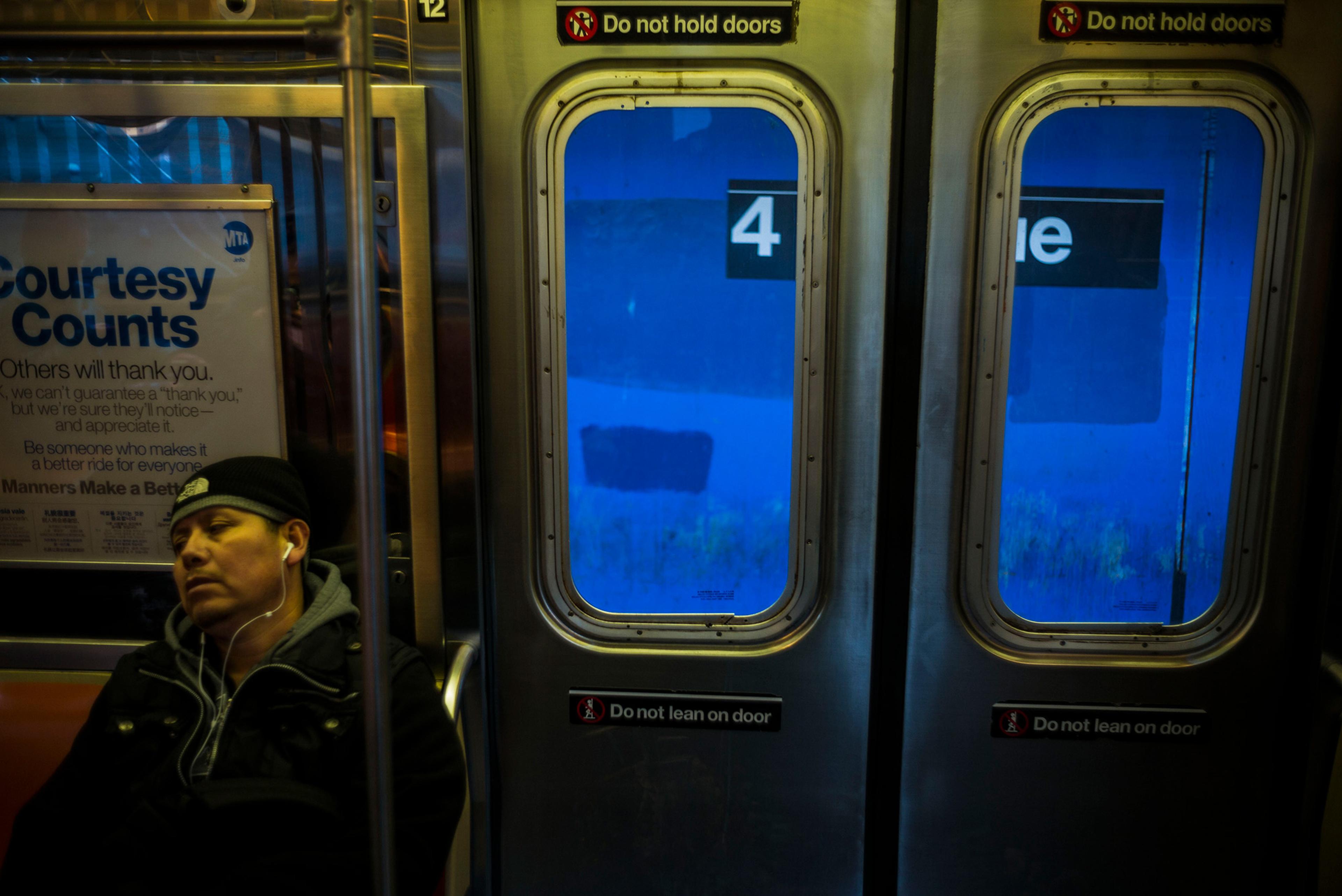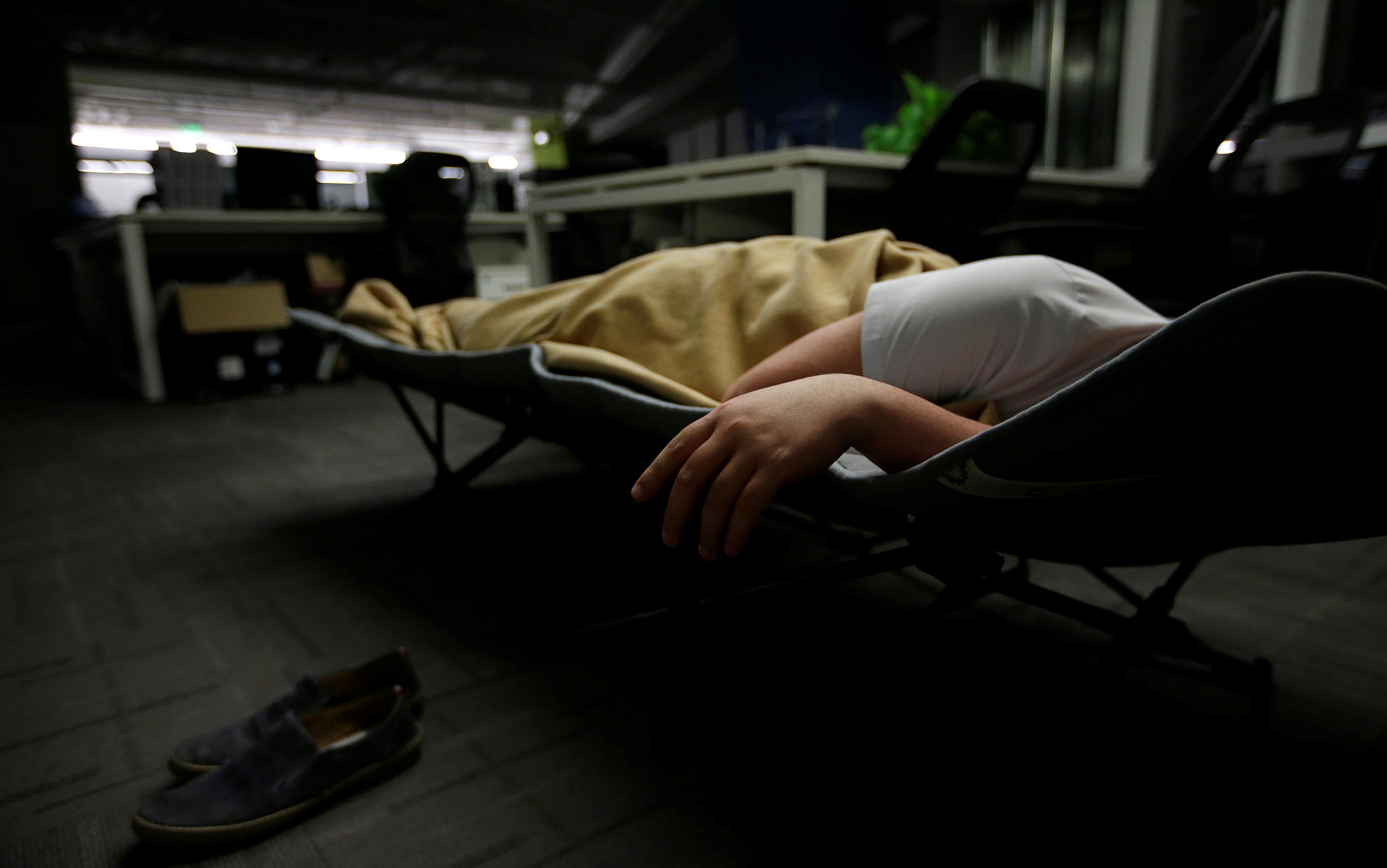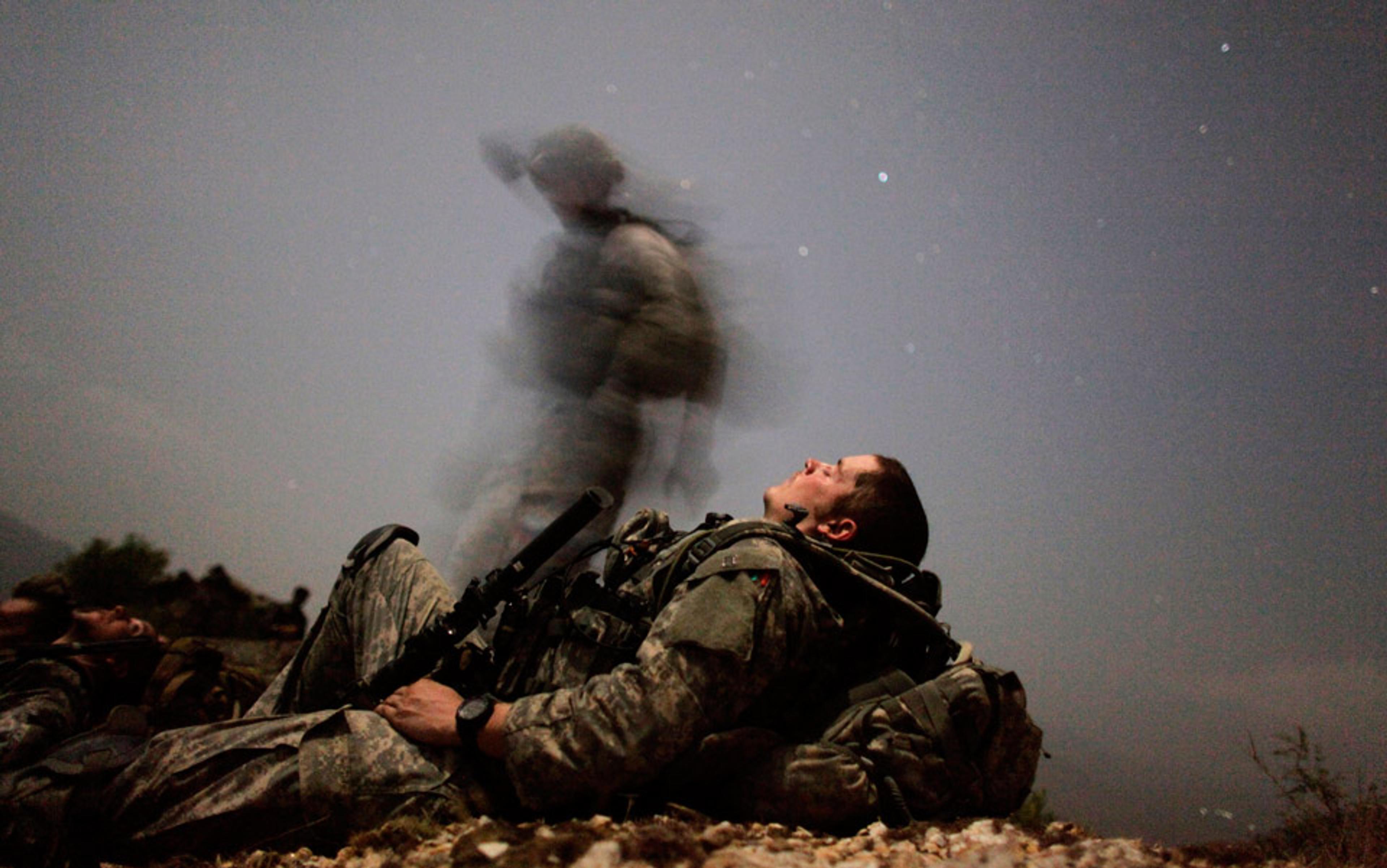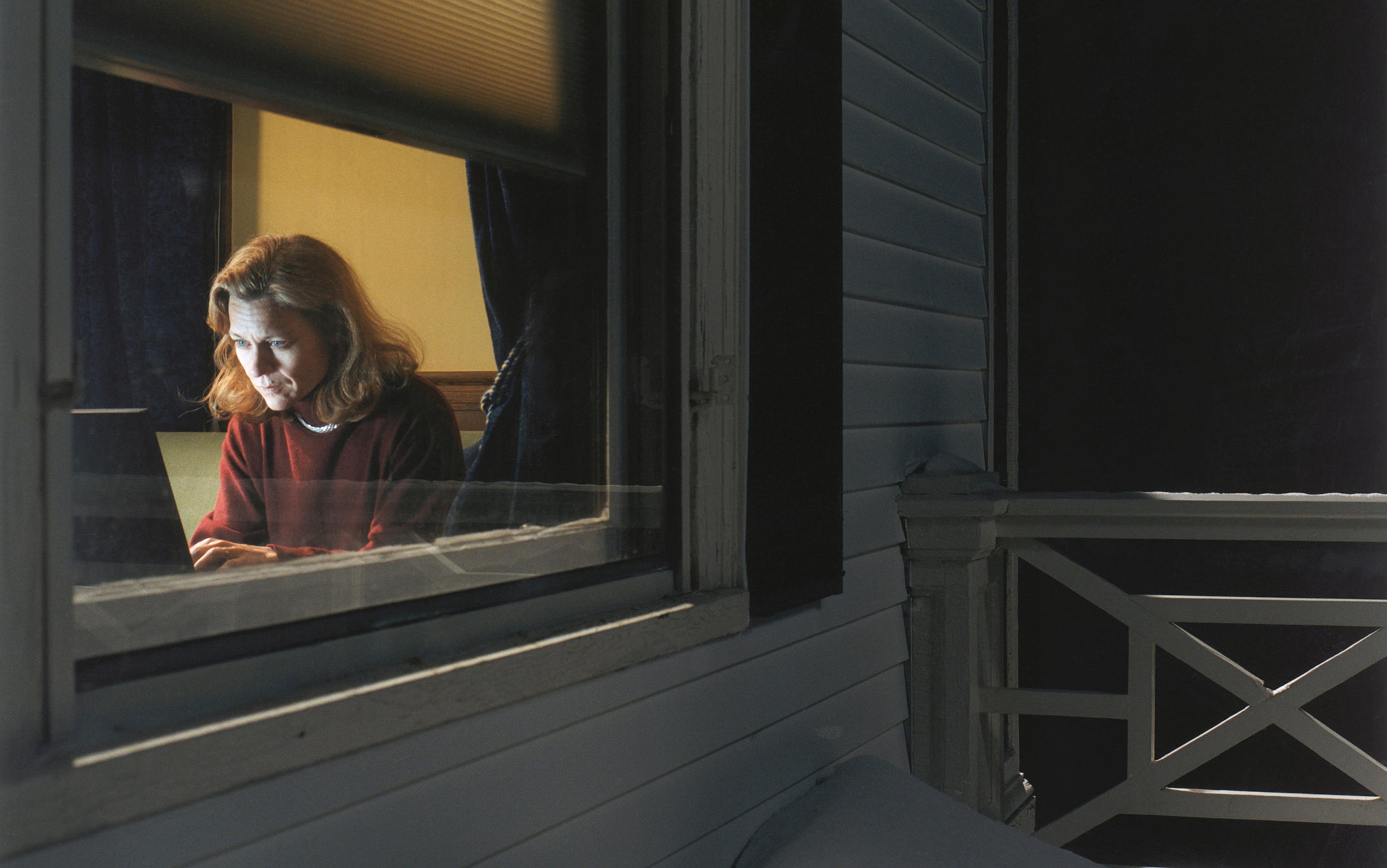For Uber drivers trying to make ends meet, it can be tempting to sleep in the car. It saves on a few journeys and helps make the most of peak-hour business. It keeps a driver readily available for work – and the apps favour those who can clock up the hours. There are carparks where the sleeping bags come out after dark, if only for five or six hours.
Sleeping in a vehicle is clearly not great. There are the obvious obstacles to adequate rest – how to get comfortable, how to deal with the light, temperature and lack of facilities. The sleep is typically short and poor. Then there are questions of privacy – exposure to onlookers, from passersby to police. Sleeping in a car means breaking a norm, often attracting suspicion. To sleep where you work has its own degradations – a sense of permanent connection, perhaps of exploitation. And it almost certainly means sleeping alone.
The carpark sleeper is one of the more dramatic expressions of poor sleep in the contemporary world. Across many walks of life, spanning public and private sectors, people are sleeping badly – and some much more so than others. Between the poles of homelessness and luxury lie multiple varieties of quiet suffering. One effect of COVID-19 has been to highlight inequalities in who gets to sleep well, with such figures as the exhausted medic or delivery-driver coming to symbolise the exceptional demands that fall on some. The divides around sleep have rarely been starker.
When sleep is lacking or disrupted, and especially when these problems are unevenly spread, questions of justice arise. Harmful, undeserved and avoidable forms of inequality emerge, as people find themselves living at odds with the demands of their body and the norms of a wider society. A range of physical, material and social hardships kick in, often paired with political handicaps to do with the exercise of rights. To be deprived of sleep is to be deprived of much more than one’s hours of rest. Moreover, those spared these hardships tend to contribute, if unintentionally, to perpetuating the problems, and often benefit from them too. This is the domain of circadian justice, where the banners read: No equality without equality of proper sleep!
Problems of sleep matter because they are not just symptoms of other problems. They have their own significance. Bad sleep can make bad circumstances less bearable, and is often the thing that makes them unbearable. It comes with a distinct set of risks. And it can affect people’s ability to change their circumstances, making other disadvantages more sticky. What opportunities exist for improving conditions will often be missed by those too tired and demotivated to act. Poor sleep is a corrosive disadvantage – one that yields more of the same.
Although sleep is a need, it is a negotiable one. Societies have historically varied in their practices, and minorities have got by on less than is needed, sometimes for a lengthy period. Everyone weighs sleep against other priorities. This plasticity is what gives scope for the individual to be exploited, by herself and others, as sleep’s nonessential component is eroded. Sleep inequalities persist because their consequences can be deferred – but they cannot be deferred indefinitely.
It is standard to claim that short sleep is on the rise. It is said that today’s typical North American sleeps 6.5 hours a day, down from 10 hours in the early 1900s. Such claims are often contested, and averages in any case are misleading. More certain is change at the extremes. Short sleep afflicts an expanding minority of the working population. Various factors are involved, from technological change to capitalist productivity demands. Weak trade unions and low rates of pay raise the demands on individual workers – the pressure to do overtime, or to take on multiple jobs. Such pressures recall those of the 19th century described by Karl Marx in ‘The Working Day’ (1867), but with less worker organisation to contain them. Noise pollution from contemporary transport infrastructure is an aggravating factor, along with ever more immersive electronic devices.
Short sleep is often coupled with irregular sleep. For a substantial minority, hours of rest change in quick succession. They involve departures from night-time sleeping, and inconstancy and uncertainty in location. The service sector offers many examples. The term ‘clopening’ describes shift patterns that involve a worker closing a business (a café, a bar) in the late evening and then opening it again the next morning, leaving the worker no time for a full night’s rest. Despite efforts to outlaw it, the practice remains widespread in North America and beyond.
Irregular sleep can itself be a source of exhaustion. Shift workers report it as among the most difficult aspects they face. Often, it corresponds to a lack of control, inhibiting the planning required to adapt. In precarious jobs, timetabling is often finalised at short notice. In the US, a quarter of service-sector workers get no more than 72 hours’ notice, according to recent research by the Harvard Kennedy School. Scheduling is often automatised, leaving no-one to complain to. The individual must adapt or risk their job; women and racial minorities are especially hard hit. In more affluent sectors, the rise of working from home adds its own disruption by eroding the boundary between work and repose.
A third contemporary trend less discussed is the desynchronisation of sleep. More than 10 per cent of UK workers do night shifts, in the care, nursing, emergency and transport sectors especially – a 3 per cent increase in five years. Such trends are pronounced in developing countries too. The outsourcing of call centres and IT services to eastern Europe and Asia has created groups of workers expected to live by the timezones of Western markets. A minority emerges, defined by its misalignment with local norms. As the pandemic pushes new kinds of service workers online – eg, in teaching or healthcare, and in the West as well as in its markets – a ‘24/7’ world looks increasingly near.
The burdens of sleeping at odd hours become unmanageable as people get older
Tendencies towards the shortening, irregularisation and desynchronisation of sleep are not without positives. Economic productivity may increase. Individuals may link up with international markets. For night workers, there are the freedoms that come with absent bosses. But these tendencies raise questions about who gets to sleep well, and in a way that pairs smoothly with other aspects of life.
As one UK doctor told The Guardian in 2016:
Last year my commute was 10 miles down winding country lanes and after a series of seven consecutive night shifts (totalling a 90-hour week) I crashed my car into a brick wall outside my house. Fortunately the damage was only material. My hospital didn’t provide rest facilities after a night shift so when I finished my medical shifts at 10-11am I would have to decide whether to risk driving home or sleep in our communal staff room where my day-time colleagues would be taking their breaks. There is no dignity in this. It is not safe and it is not fair to the doctors forced to make these decisions or to the patients they are treating half an hour earlier.
Increased risk of accident is one of the more dramatic effects of short and irregular sleep. Two in five UK doctors have reported falling asleep at the wheel, and some are known to have died. Among the other disadvantages associated with poor sleep are obesity, infection, psychological illness, attention deficit, and weak memory. Bad sleep also compounds unrelated problems. It affects a person’s mood, and thereby their evaluation and experience of what they encounter. It can heighten disadvantages to do with class, race, gender, as well as people’s appraisal of the prospects for changing their circumstances. Less privileged groups tend to have less regular sleep, less control over its timing, less motivation to protect it, and less capacity to set the norms by which society lives.
One may speak of a ‘sleep cleavage’, dividing the deprived and the rested. Those on the wrong side of these inequalities are not just those who sleep shorter than average hours, but those with particular needs. The same demands vary in their impact on different chronotypes. ‘Natural long sleepers’ are especially affected by short or irregular sleep. Those afflicted by illness may have greater need of sleep. Age matters too: ethnographic work on night-shift workers suggests the burdens of sleeping at odd hours become unmanageable as people get older. And then there are the ‘larks’ or ‘night owls’, with a predisposition to rise early or late, for whom even standard routines of work or education may be hard to maintain, and for whom demands pushing them further from their natural patterns are especially difficult.
From a libertarian perspective, it might be said that sleep inequalities are not matters of injustice. They are a reflection of people’s choices – to accept certain roles or pursue certain activities. Those Uber drivers catching a few hours of sleep in the carpark might live an uncomfortable life, but have they not embraced it? The problem of course is that individual choices are often constrained by lack of alternatives. Even the supposedly self-employed may be driven by platform technology to work longer and more irregular hours than they would like. Those who are chronically sleep-deprived may also be unaware of how fatigued they are, making them an unreliable assessor of their condition. And individual decisions have effects on others – family, neighbours and strangers. They cannot be evaluated looking only at their implications for those first affected – they have their externalities.
This becomes clearer as we consider the implications of sleep desynchronisation. Consider a call-centre worker on the late shift, returning home in the early hours to a small flat she shares with her parents. She sleeps on the sofa to avoid disturbing their sleep, but her father sleeps lightly and is woken – her night begins with an argument. She is still playing it over as her head hits the pillow, but manages to get off to sleep. She gets a few decent hours before the parents are up to make coffee at 7am. She asks them to be quiet and to turn down the radio – they do so for a while, but the walls are thin, and the second time she asks they are not having it. In any case, there is a group of noisy children outside, making their way to school. It is too hot for the window to stay closed. There is a period of quiet around 8.30am, but then the drilling upstairs begins. She speaks to her neighbour, but what can he do – the workers like to get the heavier work done in the morning, and they’ve already been holding off for an hour.
Those with a ‘normal’ schedule should avoid freeriding on the sacrifices of those sleeping to irregular schedules
To be part of a sleep minority is to be deprived of the support of social norms. Night sleepers can legitimately ask those who disturb them to be quiet, and can expect their personal space to be respected. Day sleepers must be more assertive in defending their peace and privacy, and must reckon with the likelihood that they will be ignored or rebuked. When awake, they could be accused of disturbing the privacy of others, or even of acting suspiciously. To be part of a sleep minority is to be vulnerable to condemnation. It is to have to justify yourself where others do not.
There are also more material inequalities. From doctors and dentists to education systems, public institutions in contemporary societies are still configured to norms of daytime access, disadvantaging the minorities that live to other rhythms. Not only are day sleepers directly affected but so are their dependants. Shift workers with children in school are caught between two sleep schedules, burdened by the demands of both. Such children are said to miss school more often, and show behavioural and medical problems. The challenges aggravate broader inequalities to do with healthcare and education, and have gendered effects as partners try to pick up the strain at home.
These inequalities are matters of justice insofar as their effects are unchosen and undeserved. Significant minorities are excluded from the advantages available to the majority. Indeed, the majority may benefit from the minorities’ existence, eg, as shift workers perform social functions. Fairness would suggest that those sleeping to a ‘normal’ (night-time) schedule should avoid freeriding (or cheap-riding) on the sacrifices of those sleeping to irregular schedules, from whose actions they accept the benefits.
The most damaging forms of inequality linked to sleep may be political. Exercising the rights of citizenship depends on supporting resources – the economic and personal security, and time and energy, that allows people to look beyond immediate needs. When sleep is meagre in quantity, poor in quality or timed in a way that hinders other activities, civic engagement suffers.
It is said that voting and protest are lower among the chronically fatigued. Those whose sleep is irregular struggle to plan their participation and take advantage of what free time they have. Night workers may additionally feel alienated from daytime affairs and institutions. The fact that sleep disadvantages tend to cluster with other kinds of disadvantage means that those less inclined to exercise their political rights may also be those most in need of them. Policies they might benefit from – including fair compensation for sleep-harming labour – become less likely if they are absent from the process. The desynchronisation of sleep also reduces the overlapping free time in which people can coordinate politically. From protests to party meetings, active citizenship depends on the availability of free time that is shared, and by those not so exhausted as to seek only privacy.
A tired population is likely to be more accepting of regime types that make fewer demands on their participation. Tiredness impairs an individual’s ability to take decisions for themselves. It inhibits the cognitive functions required for an outlook that is other-oriented, deliberative and action-centred. Political disengagement is one likely outcome, but so is acceptance of charismatic and technocratic forms of rule that vest decision-making in elites.
Sleep can be a way to divide and rule – an axis of competition and insecurity
Erich Fromm observed in Escape from Freedom (1941) that autocratic forms of politics thrive when populations are characterised by a ‘state of inner tiredness and resignation, which … is characteristic of the individual in the present era even in democratic countries’. For Fromm, a psychoanalyst, such vulnerability was among the conditions facilitating the rise of fascism in his native Germany. He went so far as to emphasise Hitler’s capacity to manipulate an audience by playing on their exhaustion:
he [Hitler, in Mein Kampf] does not even hesitate to admit that physical tiredness of his audience is a most welcome condition for their suggestibility. Discussing the question which hour of the day is most suited for political mass meetings, he says: ‘It seems that in the morning and even during the day men’s willpower revolts with highest energy against an attempt at being forced under another’s will and another’s opinion. In the evening, however, they succumb more easily to the dominating force of a stronger will.’
According to Fromm, it was by manipulating people based on their need of sleep that the authoritarian ruler hoped to win the consent of citizens to the loss of their political rights.
Sleep can also be a way to divide and rule – an axis of competition and insecurity. One of the functional explanations of simultaneous sleep in modern societies has to do with conflict-prevention and solidarity. When people sleep in synchrony, there is less reason for individuals to fear others making gains at their expense. True repose, one might say, depends on the belief that others are resting too. It involves the suspension of competition. With the desynchronisation of sleep in a 24/7 society, this can no longer be assumed. The next car in the carpark is ready to go, the Uber app awaiting the login. However an individual times their sleep, they must reckon with the activity of wakeful peers. They must reckon with the prospect of missing out, whether in the workplace or the wider society. For those asleep while others are interacting, there is always the possibility that key things happen without them – that by the time they awake, the moment has passed.
Insofar as sleep is discussed in public policy today, it tends to be framed as a matter of self-care. Individuals are encouraged to make good choices. The pattern is replicated in public debate, as commentators recommend practices of ‘sleep hygiene’, such as aiming to go to sleep around 10pm. As an approach to circadian justice, this seems wholly insufficient. Such responses tend to privatise sleep and its discontents. Holding individuals responsible for collective problems is generally a bad idea, but especially in an area like sleep, where feelings of personal responsibility generate added anxiety.
More promising is to ask whether existing societies might be redesigned in ways that serve circadian justice. What might this involve? In the first instance, addressing the causes of short and irregular sleep. In addition to controls on the working week, one would look to controls on the length of shifts. Employment rights that give workers more say in their schedules are crucial, and are starting to emerge, for example in the form of ‘predictive’ (or secure) scheduling laws in the US. Meanwhile, proposed ‘right to disconnect’ legislation in the EU would set aside hours when employees are not expected to respond to work communications, offering some protection for hours of rest. In many sectors, as adaptations during COVID-19 have shown, employees can also be given more discretion in when they start work.
Some argue that sleep should be protected legally. A ‘right to sleep’ could be understood as a way to support the exercise of political rights, extending a principle articulated by the English sociologist T H Marshall’s lecture ‘Citizenship and Social Class’ (1949). Admittedly, upholding it would not be straightforward, but in some ways its imprecision is part of its appeal. A demand for good sleep is one that touches on many different things, from the right to sufficient time to sleep to a right to a place for it.
What, though, of desynchronisation? A possible goal would be to reverse it. One might call this the homorhythmic model, centred on the ideal of synchronised sleep. Legal measures that could support it include employment laws that block out certain hours for common repose, in the manner of Sunday trading laws. Insofar as contemporary patterns are connected to the globalisation of economic relations, regulations would be needed to re-localise economic activity. Ultimately however, no modern society can aim for simultaneous sleep. If hospitals and other amenities are to be open at night, some degree of desynchronisation must be accepted.
Those who have poor sleep in common lack markers by which to identify one another, other than a yawn
The alternative is to embrace the desynchronisation of sleep – a polyrhythmic model, that is. This would involve facilitating different schedules of sleep and reducing the extent to which any is a source of disruption and disadvantage. Such an approach respects people’s different biological needs and their freedom to choose the schedules they live by. While desynchronised living today is typically chosen for lack of alternatives, one can imagine a world in which it is freely embraced – a utopian ideal rather than an unwished reality.
Reconfiguring public institutions so that they can be accessed at all hours – turning day institutions into day-and-night institutions – is one small move that could support this. Unemployment agencies, housing agencies and civic offices spring to mind, as well as the sites of trade unions and parties. Less obviously, one might seek the creation of 24-hour civic centres, with amenities including wifi and public canteens, as places of civic access, social interaction, and alternatives to the junk food typically relied on by those working irregular hours. More national holidays to allow recovery sleep, and common periods of free time to allow shift workers to reconnect with their peers, would create further opportunities for political participation and renewed solidarity. Setting minimum lengths to decision-making processes, so that interventions and objections can be made at any point over a 24-hour period, are among the changes that institutions and corporations might be expected to adopt.
But ultimately a polyrhythmic approach would need to extend to many aspects of social reform. High-density housing structures, from blocks of flats to terraced houses, often date to an age when people worked approximately the same hours, minimising their mutual disturbance. Renovating them for an age of desynchronised activity would involve stronger regulations on noise and light insulation, on social spacing and affordability. Allowing people to live less cramped lives, especially in the context of more working from home, seems critical for limiting the inequalities of sleep. The issues extend out to the fundamentals of how society and economy are organised.
The problem with focusing on public policy is that it assumes a measure of good will on the part of governments. Many of the political challenges discussed arise because this cannot be assumed. People’s ability and inclination to participate in democratic processes matters because the benevolence of their rulers is not assured. A rested population, and everything needed to achieve it, may be one of the lower priorities of governing officials, perhaps not even desired. What would it mean to tackle the implications of poor sleep without the support of a sympathetic administration – in a manner more redolent of the 19th-century struggles described by Marx?
Insofar as contemporary industrialised societies display a sleep cleavage, it is a difficult one to mobilise. Those who have poor sleep in common may have little else in common, and may lack markers by which to identify one another, other than the occasional yawn. They may also be transient minorities, insofar as some move in and out of different schedules. One of the challenges of circadian justice today is that it is not at all clear who its agents would be.
The fundamental problem is that only institutions and organisations, as things abstracted from the vulnerabilities of individuals, can withstand the pressures of fatigue and seek to tackle its causes, yet these are what people afflicted by short, irregular and desynchronised sleep will generally struggle to establish and influence. Individuals who are tired and separated from each other by their schedules of repose must rely ever more on intermediary associations – the party, the union, the political movement – to address their burdens, yet are separated from these by the inequalities they are subject to. If the fatigued minorities of contemporary societies are to arrest the spiralling effects of poor sleep, probably the initiative will have to come from the well-rested.






